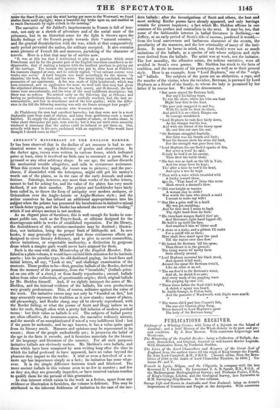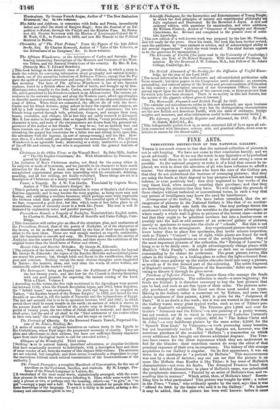PUBLICATIONS RECEIVED.
_Etchings of a Whaling Cruise; with Notes of a Sojourn on the Island of Zanzibar; and a brief History of the Whale-fishery in its past and pre- sent condition. By J. Ross Browne. With numerous Engravings and Wood-cuts. The Minstrelsy of the English Border: being a Collection of Ballads, An- cient, Remodelled, and Original, founded on well-known Border Legends. With Illustrative Notes, by Frederick Sheldon.
The Lives of the Lord Chancellors and Keepers o f the Great Seal of England, from the earliest times till the reign of King George the Fourth. By John Lord Campbell, A.M., F.R.S.E. [Second series, from the Revo- lution of 1688 to the death of Lord Chancellor Thurlow, in 1806.] Vo- lumes IV. and V.
Travels in Lycia, Mayas, and the Caratia in company with the late Reverend E. T. Daniell. By Lieutenant T. A. B. Spratt, R.N., F.G.S., of the Mediterranean Hydrographical Survey; and Professor Forbes, FRS, of King's College, London and the Geological Survey, late Naturalist to H.M. Surveying-Ship Beacon. In two volumes. Savage Life and Scenes in Australia and New Zealand; being an Artist's Impressions of Countries and People at the Antipodes. With numerous
Illustrations. By George French Angas, Author of "The New Zealanders Illturtrated,"&e. In two volumes.
The Sikhs and Afghans, in connexion with India and Persia, immediately before and after the death of Runjeet Si ugh: from the Journal of an Ex- pedition to Kabul, through the Punjab and the Klaiber Pass. By Shaba- met Ali, Persian Secretary with the Mission of Lieutenant-Colonel Sir C. M. Wade, C.B. to Peshawr in 1839, and now Mir Munshi to the Political Resident in Malwa.
Chronicles of "The Fleet Prison." From the Papers of the late Alfred Seedy, Esq. By Charles Rowcroft, Author of "Tales of the Colonies, or the Adventures of an Emigrant," &c. In three volumes.
The African Wanderers; or the Adventures of Carlos and Antonio. Em- bracing interesting Descriptions of the Manners and Customs of the West- ern Tribes, and the Natural Productions of the country. By Mrs. R. Lee, (formerly Mrs. T. Edward Bowdich). .[This book belongs to the didactic class of juvenile fictions, in which a story is made the vehicle for conveying information about geography and natural history; In Short, one of the numerous imitations of Robinson Crusoe, except that De Foe rave the spirit of nautical adventure and savage life, without professing matter-of- fact accuracy. The hero of The African Wanderers is one of two Spanish orphans, found by a British officer on the field of battle, and brought up by him: Henriquez takes steadily to the desk; Carlos, more adventurous, is anxious to see life, and is permitted by his friends to embark in an African trader. The various ad- ventures in the outward voyage, and along the Western coast, afford opportunities to describe nautical economy, the wonders of the deep, and the characteristics of the coast of Africa. When these are exhausted, the officers die off with the fever: Carlos and his friend Antonio, going ashore to bury the captain and surgeon, are left by a half mutinous crew. The land adventures now commence; the two friends being carried through toils, privations, dangers, and escapes from man, beasts, crocodiles, and climate, till at last they are safely restored to Liverpool. Mrs. R. Lee states in her preface, that as regards Africa, every production, every character is true, and most of the circumstances are drawn from the personal ex- periences of the author or her friends." It may be so; but an incident here and there reminds one of the proverb that "travellers see strange things,"—such as mistaking the gorged boa constrictor for a fallen tree and sitting down upon him, the adventure with the ienas, (a sort of ourang-outang,) and the like. How- ever, these, if a belle outré, are perhaps merely the necessities of art. The African Wanderers is an agreeable book; interestingas a story, instructive as a picture of far-off life and nature, by one who is acquainted with the general features of both.] Christmas in the Olden Time; or the Wassail Bowl. By John Mills, Author of "The Old English Gentleman," &c. With Illustrations by Duncan, en- graved by Linton.
[An imitation of Boa's Christmas stories, not fitted for the young either in its subjects or mode of treatment, and too juvenile in its character to have much attraction for the old. The main story is the tale of a rustic tempted by some unexplained supernatural person into quarrelling with his sweetheart, drinking, pmehing, and all but robbing yet finally reclaimed. These things are set in a description of Christmas at a hearty country squire's.]
Faust; a Tragedy. By J. W. Von Goethe. Translated by Captain Knox, Author of The Rittmeister's Budget," &c. [This is probably as accurate as any translation in verse of Goethe's chef d'ceuvre that has appeared; and it may become the most popular, as being more easy and flowing, and exhibiting a reckless looseness, which perhaps more truly represents the German mind than greater refinement. The essential spirit of Goethe has, we fear, evaporated a good deal; but this, which more or less takes place in all translations, must of necessity occur in a work like Faust. The text is well il- lustrated by explanatory notes and parallel passages.) Prometheus Bound; a Tragedy of Aschylas. Translated into English metre, by Charles G. Prowett, M.A., Fellow of Gonville and Cains College, Cam- bridge.
[This translation will rather give an idea of the structure, plan, end sentiments of the Prometheus Bound, than of the poetry of Eschylus, or of the characters of the drama, so far as they are discriminated by the tone of their speech in oppo- sition to the mere ideas. These are well enough marked as regards sentiments, and the translation is smooth and easy. Mr. lerowett also renders the metres of Eschylus into the nearest English substitute, and thus shows the variations of the original better than the blank verse of Potter and others.] Heroic Odes and Bacchic Melodies. By George St. Edmonde.
[The subjects of the heroic odes, "Waterloo " for example, are mostly far beyond Mr. George St. Edmonde: the topics of the Bacchie Melodies and occasional poems are nearer his powers; but, though brisk and fluent in the versification, they are poor and common. Nothing except the most obvious thoughts seem suggested by Nature: the manner, ideas, and very often the words of other writers, are continually called to the Lader's mind.]
The Retrospect: being an Inquiry into the Fulfilment of Prophecy during the last twenty years; and also how far the Church is thereby furnished with any good grounds for expecting the instant coining of the Lord. With a Chart. Volume I.
[According to this writer, the five vials mentioned in the Apocalypse were poured out between 1792, when the French Revolution began and 1815, when Napoleon, the "Infidel beast," was overthrown. The sixth veil began to be emptied on Turkey, "the Eastern branch of the Roman Empire," in 1822, and lasted for two decades or so—that is, till the battle of Navarino and the independence of Egypt. The last and seventh vial into be in operation between 1847 and 1867; in which period there shall be muoh trouble in the earth; an earnest of which is shown in the present dearth and the failure of the potato crop in Ireland. During this period of twenty years, the two tribes of Judah shall be restored; and Antichrist shall arise; but the end of all shall be the "final settlement of the twelve tribes in their own land," the coming of Christ, and his reign on earth The Portrait of Charity. By the Reverend Francis Trench, Perpetual Cu- rate of St, John's, Reading, &c. [A series of sermons or religious hortatives on various texts in the Epistle to the Corinthians, where Paul urges the paramount necessity of charity. fhey are plain and affectionate in their address, but have not sufficient literary character apart from their theological merit to call for extended notice.] Glimpses of the Wonderful. Third series.
[ Striking fasts in natural history, travellers' adventures, or singular incidents that have occasionally occurred to individuals, with a description here and, there of some wonder of art, form the matter of this elegant little volume. The accounts are not selected, but compiled; and there seems occasionally a disposition to copy the marvellous without much critical consideration of the trustworthiness of the authority.]
The French Prompter; a complete Handbook of Conversation, for the use of travellers on the Continent, families, and students. By M. Lepage, Pro- fessor of the French Language in London, &c. CA vocabulary of the most usual words, alphabetically arranged, with the com- mon phrases in which the word occurs following it. Thus, while some words have only a phrase or two, or perhaps only the meaning, others—as "to give," or "to get "—occupy a page and a half. The book is only intended forpwple who have some knowledge of the language. To such it is likely to be usefu4 as being a dic- tionary and conversation-guide in one.] Scientific Dialogues, for the Instruction and Entertainment of Young People; in which the first principles of natural and experimental philosophy are fully explained and illustrated. By the Reverend J. Joyce. A new anti enlarged edition with questions for examination and other additions. By William Pinnock, Author of "Grammar of Geography and History," Catechisms, &c. Revised and completed to the present state of scien- tific knowledge. [This new edition of a well-known work was prepared by the late Mr. Pinnock, and left ready for the press. Since his death, the book has been farther revised, says the publisher, by "men eminent in science and of acknowledged ability in the several departments" which the work treats of. The chief feature appears to be the questions for examination.] . The Elements of Euclid, (the parts read in the University of Cambridge,) from the Text of Dr. Robert Simpson. With Geometrical Problems for solution. By the Reverend J. W. Colenso, M.A., late Fellow of St. Jobn's College, Cambridge, &c.
The British Almanack, of the Society for the Dijjasion of Useful Know- ledge, for the year of our Lord 1847. [The usual information in this well-known and old-established publication calls for no remark; but three papers in the Companion merit attention: an extensive, painstaking, and rational survey of the history and present condition of Education in this country; a descriptive account of our Government Offices; the usual annual report upon the new Railways of the current year, or those projected lines for which acts have been obtained. There is no novelty in this last feature, but the nature of the gigantic subject gives it interest.] The Mercantile Almanack and British Tariff; for 1847. [The calendar and miscellaneous tables in this new almanaek are upon business subjects, arranged in a businesslike way; bat its distinguishing characteristics are the new British and American Tariffs, with the rates of exchange, foreign weights and measures, and other information useful to the commercial world.] The Literary and Scientific Register and Almanack, for 1847. By J. W.
G. Gutch, M.R.C.S.L., tkc. [This indispensable pocket-book is, as usual, crammed full of facts upon all sub- jects connected with literature, science, arts, and practical affairs, down even to articles in season for the dinner-table.]



























 Previous page
Previous page